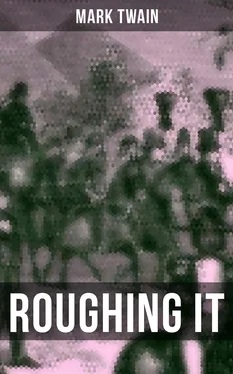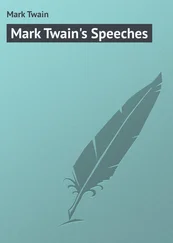So we flew along all day. At 2 P.M. the belt of timber that fringes the North Platte and marks its windings through the vast level floor of the Plains came in sight. At 4 P.M. we crossed a branch of the river, and at 5 P.M. we crossed the Platte itself, and landed at Fort Kearney, fifty-six hours out from St. Joe — THREE HUNDRED MILES!
Now that was stagecoaching on the great overland, ten or twelve years ago, when perhaps not more than ten men in America, all told, expected to live to see a railroad follow that route to the Pacific. But the railroad is there, now, and it pictures a thousand odd comparisons and contrasts in my mind to read the following sketch, in the New York Times, of a recent trip over almost the very ground I have been describing. I can scarcely comprehend the new state of things:
“ACROSS THE CONTINENT.
“At 4.20 P.M., Sunday, we rolled out of the station at Omaha, and started westward on our long jaunt. A couple of hours out, dinner was announced — an “event” to those of us who had yet to experience what it is to eat in one of Pullman’s hotels on wheels; so, stepping into the car next forward of our sleeping palace, we found ourselves in the dining-car. It was a revelation to us, that first dinner on Sunday. And though we continued to dine for four days, and had as many breakfasts and suppers, our whole party never ceased to admire the perfection of the arrangements, and the marvelous results achieved. Upon tables covered with snowy linen, and garnished with services of solid silver, Ethiop waiters, flitting about in spotless white, placed as by magic a repast at which Delmonico himself could have had no occasion to blush; and, indeed, in some respects it would be hard for that distinguished chef to match our menu; for, in addition to all that ordinarily makes up a first-chop dinner, had we not our antelope steak (the gormand who has not experienced this — bah! what does he know of the feast of fat things?) our delicious mountain-brook trout, and choice fruits and berries, and (sauce piquant and unpurchasable!) our sweet-scented, appetite-compelling air of the prairies?
“You may depend upon it, we all did justice to the good things, and as we washed them down with bumpers of sparkling Krug, whilst we sped along at the rate of thirty miles an hour, agreed it was the fastest living we had ever experienced. (We beat that, however, two days afterward when we made twenty-seven miles in twenty-seven minutes, while our Champagne glasses filled to the brim spilled not a drop!) After dinner we repaired to our drawing-room car, and, as it was Sabbath eve, intoned some of the grand old hymns — ”Praise God from whom,” etc.; “Shining Shore,” “Coronation,” etc. — the voices of the men singers and of the women singers blending sweetly in the evening air, while our train, with its great, glaring Polyphemus eye, lighting up long vistas of prairie, rushed into the night and the Wild. Then to bed in luxurious couches, where we slept the sleep of the just and only awoke the next morning (Monday) at eight o’clock, to find ourselves at the crossing of the North Platte, three hundred miles from Omaha — fifteen hours and forty minutes out.”
Table of Contents
Another night of alternate tranquillity and turmoil. But morning came, by and by. It was another glad awakening to fresh breezes, vast expanses of level greensward, bright sunlight, an impressive solitude utterly without visible human beings or human habitations, and an atmosphere of such amazing magnifying properties that trees that seemed close at hand were more than three mile away. We resumed undress uniform, climbed a-top of the flying coach, dangled our legs over the side, shouted occasionally at our frantic mules, merely to see them lay their ears back and scamper faster, tied our hats on to keep our hair from blowing away, and leveled an outlook over the world-wide carpet about us for things new and strange to gaze at. Even at this day it thrills me through and through to think of the life, the gladness and the wild sense of freedom that used to make the blood dance in my veins on those fine overland mornings!
Along about an hour after breakfast we saw the first prairie-dog villages, the first antelope, and the first wolf. If I remember rightly, this latter was the regular cayote (pronounced ky-o-te) of the farther deserts. And if it was, he was not a pretty creature or respectable either, for I got well acquainted with his race afterward, and can speak with confidence. The cayote is a long, slim, sick and sorry-looking skeleton, with a gray wolf-skin stretched over it, a tolerably bushy tail that forever sags down with a despairing expression of forsakenness and misery, a furtive and evil eye, and a long, sharp face, with slightly lifted lip and exposed teeth. He has a general slinking expression all over. The cayote is a living, breathing allegory of Want. He is always hungry.
He is always poor, out of luck and friendless. The meanest creatures despise him, and even the fleas would desert him for a velocipede. He is so spiritless and cowardly that even while his exposed teeth are pretending a threat, the rest of his face is apologizing for it. And he is so homely! — so scrawny, and ribby, and coarse-haired, and pitiful. When he sees you he lifts his lip and lets a flash of his teeth out, and then turns a little out of the course he was pursuing, depresses his head a bit, and strikes a long, soft-footed trot through the sagebrush, glancing over his shoulder at you, from time to time, till he is about out of easy pistol range, and then he stops and takes a deliberate survey of you; he will trot fifty yards and stop again — another fifty and stop again; and finally the gray of his gliding body blends with the gray of the sagebrush, and he disappears. All this is when you make no demonstration against him; but if you do, he develops a livelier interest in his journey, and instantly electrifies his heels and puts such a deal of real estate between himself and your weapon, that by the time you have raised the hammer you see that you need a minie rifle, and by the time you have got him in line you need a rifled cannon, and by the time you have “drawn a bead” on him you see well enough that nothing but an unusually long-winded streak of lightning could reach him where he is now. But if you start a swift-footed dog after him, you will enjoy it ever so much — especially if it is a dog that has a good opinion of himself, and has been brought up to think he knows something about speed.
The cayote will go swinging gently off on that deceitful trot of his, and every little while he will smile a fraudful smile over his shoulder that will fill that dog entirely full of encouragement and worldly ambition, and make him lay his head still lower to the ground, and stretch his neck further to the front, and pant more fiercely, and stick his tail out straighter behind, and move his furious legs with a yet wilder frenzy, and leave a broader and broader, and higher and denser cloud of desert sand smoking behind, and marking his long wake across the level plain! And all this time the dog is only a short twenty feet behind the cayote, and to save the soul of him he cannot understand why it is that he cannot get perceptibly closer; and he begins to get aggravated, and it makes him madder and madder to see how gently the cayote glides along and never pants or sweats or ceases to smile; and he grows still more and more incensed to see how shamefully he has been taken in by an entire stranger, and what an ignoble swindle that long, calm, soft-footed trot is; and next he notices that he is getting fagged, and that the cayote actually has to slacken speed a little to keep from running away from him — and then that town-dog is mad in earnest, and he begins to strain and weep and swear, and paw the sand higher than ever, and reach for the cayote with concentrated and desperate energy. This “spurt” finds him six feet behind the gliding enemy, and two miles from his friends. And then, in the instant that a wild new hope is lighting up his face, the cayote turns and smiles blandly upon him once more, and with a something about it which seems to say: “Well, I shall have to tear myself away from you, bub — business is business, and it will not do for me to be fooling along this way all day” — and forthwith there is a rushing sound, and the sudden splitting of a long crack through the atmosphere, and behold that dog is solitary and alone in the midst of a vast solitude!
Читать дальше












